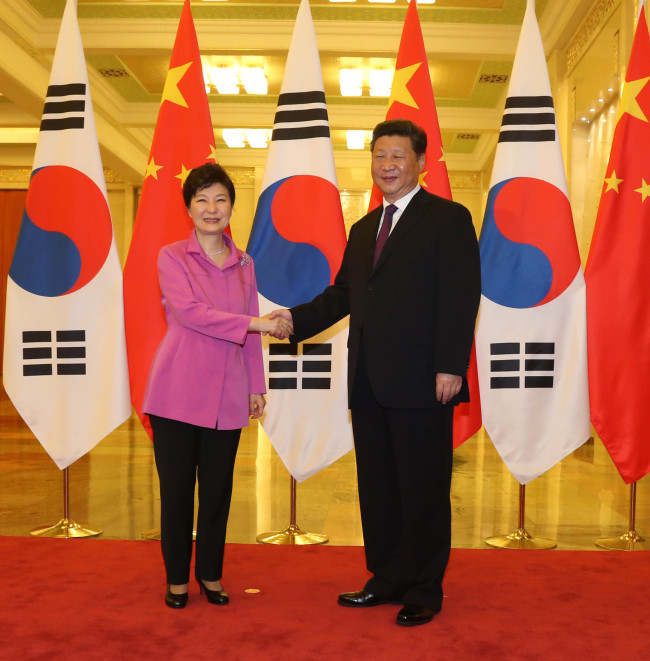President Park Geun-hye met with Chinese President Xi Jinping for talks expected to focus on how to move forward bilateral relations and how to deal with North Korea and other regional issues, South Korean officials said Wednesday.
No details of their meeting — the sixth such summit between the two leaders since Park took office in early 2013 — were immediately available.
 |
| President Park Geun-hye met Chinese President Xi Jinping Wednesday (Yonhap) |
Park and Xi were to hold a luncheon meeting following their summit in what South Korean officials describe as an unusual move that underscores China’s special hospitality toward Park.
The meeting came soon after Park touched down in Beijing for a trip meant to attend a high-profile ceremony marking the 70th anniversary of China’s victory over Japan in World War II.
North Korea could be high on the agenda for Park’s meeting with Xi following recent tensions on the Korean Peninsula that were later defused in a breakthrough deal between South and North Korea.
The meeting came amid no sign of progress in ending North Korea’s nuclear weapons program.
North Korea has spurned repeated international calls to abandon its nuclear program, viewing it as a powerful deterrent against what it claims is Washington’s hostile policy against it.
South Korea has asked China to prod North Korea to rejoin the long-stalled talks on ending Pyongyang’s nuclear program.
China is believed to have significant leverage over North Korea, which has long been dependent on Chinese diplomatic support and economic aid.
Also Wednesday, Park is set to hold separate talks with Chinese Prime Minister Li Keqiang on how to boost economic cooperation.
China fought on North Korea’s side against South Korea and the U.S.-led U.N. forces in the 1950-53 Korean War, but has been economically drawn to South Korea after establishing diplomatic relations in 1992.
China has overtaken the United States as South Korea’s No. 1 trade partner in recent years. South Korea and China also signed a free trade agreement in June, though the deal has yet to be ratified by the respective legislatures of Seoul and Beijing.
On Thursday, Park plans to watch a massive military parade in Tiananmen Square that could showcase the growing military prowess of an assertive China.
Park’s planned attendance has drawn some criticism that South Korea may be tilted toward China, but it represents Seoul’s latest attempt to win Beijing’s cooperation over North Korea’s nuclear program.
“Some people will not like her presence at the military event, but the people who specialize in Northeast Asian politics and security understand why she needs to do that for domestic political reasons and South Korea’s national interests,” said Daniel Pinkston, a Korea expert at the International Crisis Group in Seoul.
Ju Chul-ki, senior presidential secretary for foreign affairs, has said that South Korea expects “China to play a role in resolving North Korea’s nuclear issue.”
South Korea and China also shared a bitter memory of Japan’s aggressions. Japan ruled the Korean Peninsula as a colony from 1910-45 and controlled much of China in the early part of the 20th century. (Yonhap)

